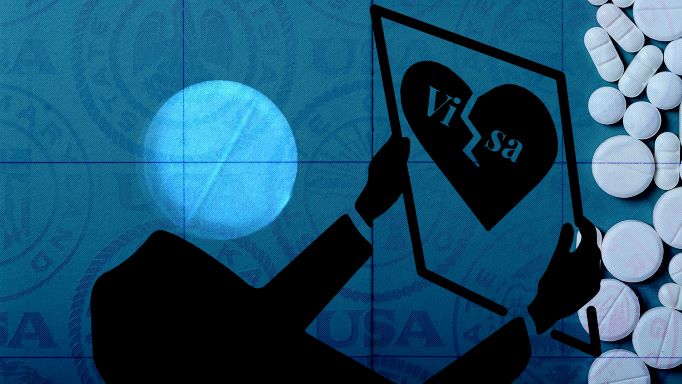Although government propaganda claims that Cuba is a medical powerhouse, and offers foreign patients the possibility of being treated on the island at specialized centers that have all the resources, the number of Cubans requesting humanitarian visas from other countries for medical reasons is increasing.
At the beginning of April, the Facebook group "Sembrando Esperanzas" (Sowing Hope) posted about the case of Alexia Milagros, who suffers from a disease called Pompe, which causes rapidly progressive generalized muscle weakness and developmental delay.
The girl is the only patient in Cuba with this diagnosis. Her family was "fighting for a humanitarian visa" so that she could be treated in the United States. A U.S. pharmaceutical company donated the medication Alexia needed, but the treatment cost $10,000, which they did not have.
In March, user Yunia Etecsa requested a humanitarian visa for her daughter Luna Morejón Santos in a post, without specifying her condition. Her subsequent posts suggest that she received it.
In February, three-year-old Ashly María Rodríguez arrived in Miami with her mother to be treated for a brain tumor, according to a Facebook post.
At the end of the same month, Karla Guiardinú Valiente asked for help on the same social network for Vanessa, a seven-year-old Cuban girl, "diagnosed with a brain tumor for which there is no possible treatment in Cuba, and life expectancy is very short."
According to the post, Larkin Hospital in the U.S. had approved the treatment, but the mother had to process a humanitarian visa and raise the money necessary, for which a fundraising campaign had been launched.
In January, the media outlet Cubaenmiami published that a Cuban boy named Franco, who suffers from acute lymphoblastic leukemia, had arrived in Miami with his mother thanks to a visa of this type.
These and other stories are added to that of Claudia Díaz Martínez, a cancer patient whose husband, Emilio Milián Socorro, decided to apply for a humanitarian visa so that she could be treated in the United States, after having been a victim of malpractice on the island, according to the contents of an interview with DIARIO DE CUBA.
In September 2020, Cuban filmmaker and animator Víctor Alfonso Cedeño also published an open letter on his social networks revealing his cancer and requesting a humanitarian visa for treatment in the United States.
After two operations, he underwent treatment with electron and photon radiotherapy, which was interrupted on several occasions due to technical failures. Not only did the tumor not diminish, but others appeared, and the doctors informed Alfonso Cedeño that his case was inoperable.
After conducting research, the filmmaker found out about institutions and hospitals in the U.S. that offered innovative and personalized treatments for his condition, so he decided to apply for the humanitarian visa. Recent posts on Facebook allow us to infer that he is fighting for his life in that country, a year and a half after Cuban doctors sent him home "to await impending death," stating that they could only help him "with palliative surgeries as the situation worsens, or in the event lung metastasis or other affectations occur."
The humanitarian visa, which consists of a temporary residence permit in the country, is issued not only for health reasons, but also to vulnerable people facing emergency situations, or for reasons of public interest. Most Cubans, however, request it for medical reasons.
Given the continuing deterioration of the Cuban health care system, which during the Covid-19 pandemic resulted in many patients with cancer and other ailments not receiving the requisite care, it is entirely plausible that these requests will increase.
For this reason, and taking into account that the U.S. is the country that receives the most requests for humanitarian visas from Cuban citizens, here DIARIO DE CUBA explains to its readers in Cuba what to take into account and how to proceed when faced with the need to obtain medical treatment in the northern nation.
The interested party must apply for a nonimmigrant visa from the Department of State. Even when most consular services were suspended, following the departure of non-essential personnel from the U.S. Embassy in Cuba due to alleged acoustic attacks on several U.S. officials, appointments for nonimmigrant visa applications are available for those who present "an emergency health condition requiring medical treatment in the United States," according to the diplomatic division’s website.
This page and the official US Immigration website state that the applicant must present "a letter from a doctor or medical institution in Cuba with a diagnosis of the visa applicant's medical condition, as well as a confirmation that the illness cannot be treated in Cuba."
One must also submit a letter from a U.S. physician or medical facility indicating "willingness and ability to treat the applicant's medical condition, the duration of treatment, and its estimated cost (including hospitalization fees and all associated medical expenses)."
In addition, the individual must provide documentation of the funds he or she will use to cover the treatment and stay in the country. The US Immigration and Customs Enforcement Service (USCIS) clarifies that a major reason visa applications are rejected is failure to provide evidence of financial sponsorship. For this reason, many Cubans in this situation choose to create accounts on GOFUND.ME to raise the funds needed to receive a humanitarian visa.
The forms that the applicant must fill out to apply for this type of visa are:
1: Form I-131, Application for Travel Document
2: Form I-134, Affidavit of Economic Sponsorship, in which one demonstrates that he or she "will not become a public burden" while in the United States.
3: Additional documentation supporting the request.
As a rule, the process takes between 90 and 120 days, but in cases of emergencies the request can be handled in a question of days. Although the procedure constitutes a high cost for any Cuban citizen, it is possible to request and receive an exemption if one can demonstrate that they cannot afford it.
